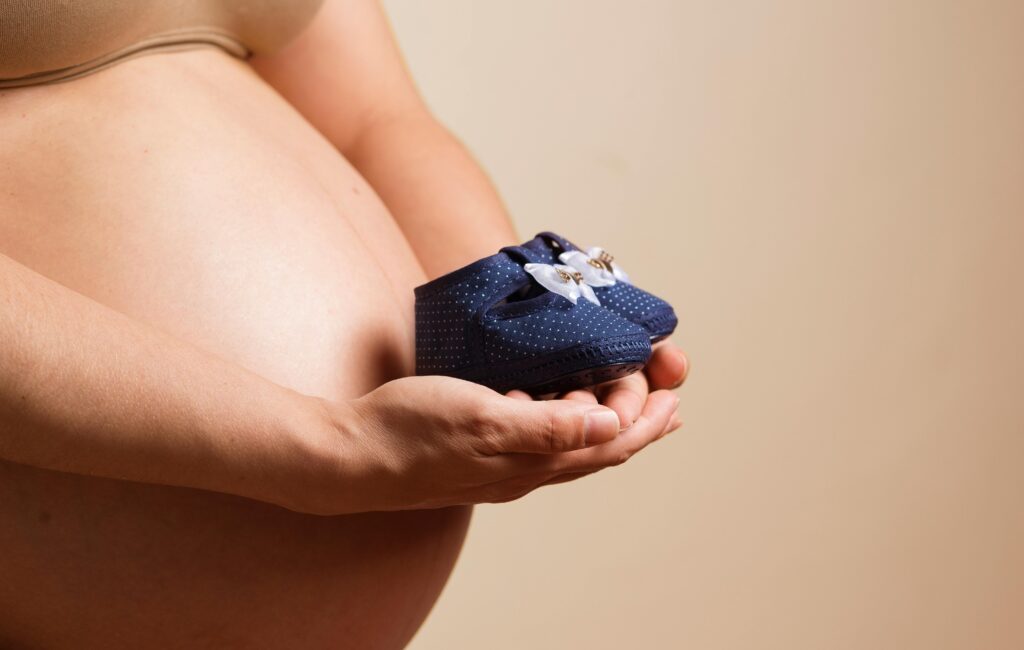A remarkable journey, pregnancy is filled with many highlights, from the earliest flutters to the excitement of holding your baby in your arms. Pregnancy is a fascinating and exciting experience, especially when you feel your baby moving inside your tummy. But, if pregnant parents see a decrease in or absence of fetal activity, it’s normal for them to get concerned. We’ll go into great detail in this thorough advice on what to do if the baby stops moving in the womb during pregnancy, including when to worry and what to do in each case.
Recognizing Fetal Movement
It’s important to comprehend the complex ballet of movements that takes place inside the womb throughout pregnancy before discussing what to do when fetal movements stop. Expectant moms typically experience “quickening,” or feeling their baby move, between weeks 18 and 25 of pregnancy. As pregnancy goes on, these movements could start off as soft flutters or faint taps and then develop into more pronounced kicks, rolls, and punches. As the baby grows and becomes more active, mothers often experience frequent, noticeable movements by the third trimester.
Affecting Fetal Movement Factors
Fetal movement patterns are influenced by a multitude of circumstances, which result in differences in the frequency, intensity, and perception of movements. It’s critical to comprehend these elements in order to distinguish between typical variations and possible issues. Let’s examine a few of the crucial elements:
Location of the Baby: How and where you feel movements is greatly influenced by the baby’s location inside the uterus. The way the baby is oriented—whether they are looking forward or backward—and how close they are to the uterine wall are some of the variables that can affect how the infant perceives movement. The cushioning effect of the mother’s tissues may cause movements to feel more muted or less noticeable when the baby is positioned with their back against the mother’s spine. On the other hand, the baby’s motions might be more noticeable and tactile if they are facing forward or positioned closer to the abdominal wall.
Activity Level: Babies go through phases of rest and activity, much like people do outside the womb. Fetal movements are perfectly typical to vary during the day, with bursts of activity interspersed with rest or sleep. Babies’ patterns of rest and activity are comparable to those of adults, who vary their levels of activity throughout the day. The baby’s level of activity in the womb can be affected by variables like the mother’s activities, mealtimes, and outside stimulation. Fetal movements are therefore frequently more noticeable after meals or when the mother is sleeping.
Gestational Age: The movements of the fetus change as the pregnancy goes on. Early in the pregnancy, movements may be irregular and mild; but, as the pregnancy progresses, they usually grow more frequent and intense. The growing fetus is relatively small in the early stages of pregnancy, and its ability to move throughout the uterus may be restricted. The baby’s movements do, however, tend to get more frequent and amplitude as they get older. As the baby’s musculoskeletal system develops in the third trimester, expectant moms frequently experience a wide range of motions, including punches, kicks, rolls, and stretches.
Mother-related Factors: Fetal mobility can be impacted by the health and lifestyle decisions of the mother. The baby’s level of activity can be affected by variables like the mother’s emotional and physical health, stress levels, physical exercise, and hydration. Maintaining the volume of amniotic fluid, which acts as a cushion for the developing baby and allows for unfettered movement inside the uterus, requires enough hydration. Although stress and anxiety in mothers might cause physiological reactions that could impact fetal activity, deep breathing exercises and prenatal yoga can help create a peaceful and supportive environment for both mother and child.

When to Show Concern
Even though fetal movement changes are common and frequently harmless, there are some situations in which less movement could call for urgent medical attention. It is imperative that expectant parents remain watchful and cognizant of the following signs:
Significant Decrease in Movement: If there is a discernible decrease in fetal movement, especially if it lasts for a long time or is drastically reduced, it should be evaluated by a doctor right once. Although the frequency and intensity of fetal movements can vary, a sudden and noticeable decrease in movement may be a sign of possible problems with the feta’s health. Expectant moms are advised to follow their gut feelings and consult a doctor if they observe any notable changes in their unborn child’s typical activity patterns.
Change in Movement Pattern: A healthcare professional should closely observe and assess any noticeable changes in the baby’s regular movement pattern. For instance, there can be a problem if the baby starts to move less frequently, weaker, or differently. Variations in the way that a fetus moves could be a sign of a number of things, such as variations in the fetus’s activity level, positional changes, or other problems that could influence the fetus’s health. It is imperative that expectant mothers continue to be aware of their baby’s movements and notify their healthcare professional of any unusual movements so that more evaluation can be done.
Persistent lack of Movement: It is important to seek medical assistance right once to determine the health of the fetus if an expectant mother observes a prolonged lack of movement, especially after the 24th week of gestation. Although there may be occasional drops in activity, a continuous lack of movement can be worrisome and may be a sign of possible problems such fetal discomfort or challenges related to the umbilical cord. For the mother and the child to have the best possible results, prompt intervention is essential.
Intuition: It is crucial to trust one’s gut feelings and intuition when expecting a child. It’s critical for pregnant mothers to seek out quick medical assessment and guidance if they sense something is off or have worries about the health of their unborn child. Known as “gut feeling,” maternal intuition is a valuable resource throughout pregnancy. It is advised that expectant mothers pay attention to their bodies and speak up for the health and welfare of their unborn child. It’s always best to err on the side of caution and get medical help if something feels strange or odd.

Steps to Take If the Baby Stops Moving
It is imperative to respond quickly and decisively if there is a decrease in fetal movement in order to protect the health of both mother and child. The steps to follow are as follows:
Do a Kick Count: To evaluate your baby’s movements in a methodical manner, do a comprehensive kick count. Take a seat somewhere peaceful and comfortable, then concentrate on counting the amount of movements you experience over a period of time, usually one to two hours. During this time, you should ideally try to feel at least ten motions. Should you fail to meet this threshold, get in touch with your physician right away for additional assessment. Fetal movement tracking, or kick counting, is a useful technique for evaluating fetal health and identifying any issues. Through monitoring the frequency and force of fetal movements over a predetermined time, pregnant women can learn more about the activity level of their unborn child and quickly detect any abnormalities.
Shift Positions: Occasionally, a mother’s shifting posture can encourage fetal movement. In a calm, comfortable place, lie on your left side and closely monitor any motions you feel. To get your baby to respond, you can also try lightly poking or caressing your abdomen. Because of variations in intra-abdominal pressure and uterine location, a mother’s posture might affect how she perceives her fetal movements. It is frequently advised to lie on one’s left side to optimize blood flow to the uterus and potentially improve fetal oxygenation. You can raise your chances of sensing your baby’s movements by shifting positions and concentrating on relaxation methods.
Rest and Hydrate: Dehydration and weariness in the mother can cause the fetus to move less. After ensuring that you are properly hydrated with a glass of water, lie down on your left side in a quiet, dimly lit room. It could be possible to perceive fetal movements more accurately by resting and reducing outside stimuli. The volume of amniotic fluid, which facilitates fetal movement and protects and cushions the developing infant, depends on adequate hydration. Fetal activity levels can also be impacted by maternal exhaustion, emphasizing the significance of rest and relaxation in fostering the best possible fetal health.
Watch for Two Hours: If after following the above instructions you have not felt any fetal movements, watch for a further two hours. During this period, note any movements you notice. If after a certain amount of time there are still no motions or if the movement is still greatly decreased, get in touch with your healthcare professional right away for additional evaluation. To rule out potential issues and protect mother and baby, prolonged periods of diminished fetal movement require rapid medical attention. Expectant women actively contribute to the protection of their unborn child’s health by closely observing fetal movements and promptly reporting any problems to medical professionals.
Seek Medical assistance: Do not hesitate to seek immediate medical assistance if you have any concerns regarding your baby’s movements or if you encounter any other troubling symptoms, such as vaginal bleeding, severe abdomen pain, or odd discharge. For a comprehensive assessment, make direct contact with your labor and delivery unit or your healthcare practitioner. In cases of pregnancy, prompt care is essential, particularly in cases of alarming symptoms or abnormalities in fetal movement. Healthcare professionals have the knowledge and tools necessary to evaluate the health of the fetus and quickly address any possible problems. If expectant moms have worries about their personal health or the health of their unborn child, they should never be afraid to seek medical counsel or support.

Possible Reasons for Reduced Movement of the Fetus
Reduced fetal movement can be caused by a variety of circumstances, from benign physiological changes to more serious underlying problems. It’s critical to be aware of these possible causes and, when needed, get the proper medical examination and care. Here are a few typical things to think about:
Baby’s Position: How the baby is positioned inside the uterus can affect how fetal movements are perceived. Movements may be less noticeable if the baby is positioned in a way that makes them difficult to sense, such as facing backward or tucked deep within the pelvis. The way the baby and mother’s belly are positioned in space might influence how fetal movements are perceived by the mother’s sensory receptors. The sense of fetal movements can also be influenced by variables such placental placement, uterine shape, and maternal obesity.
Sleep Patterns: In the womb, newborns, like all people, go through phases of awake and sleep. Fetal movements may become less frequent or intense during sleep, which can cause momentary decreases in perceived activity. Sleep cycles in fetuses are a typical aspect of development and have a major physiological role in the maturation of the brain and neural connectivity. Fetal activity levels may fluctuate throughout the day as a result of these intricately regulated sleep-wake cycles.
Maternal Factors: Lifestyle decisions and maternal health can affect fetal movement. Maternal stress, worry, dehydration, and some drugs are some of the factors that might affect the baby’s degree of activity in the womb. Hormonal reactions brought on by maternal stress and anxiety may have an indirect impact on the level of fetal activity. Dehydration can also alter the dynamics of amniotic fluid, which may affect how a fetus perceives movement. It is advised that expectant moms emphasize taking care of themselves and participate in leisure activities that enhance their wellbeing.
Problems with the Umbilical chord: The oxygenation and nutrition supply of the fetus can be affected by problems with the umbilical chord, such as compression of the cord or reduced blood flow, which can result in diminished mobility. The umbilical cord is essential for enabling the mother and infant to exchange gasses, nutrients, and waste materials. Any disruption of the umbilical cord’s normal function, including compression or entanglement, might prevent blood flow to the developing fetus, which may cause the fetus to move less and possibly experience discomfort.
Placental Disorders: Problems with the placenta, such as placental abruption or insufficiency, can compromise the baby’s ability to get oxygen and nutrients, endangering its health. The placenta provides vital nourishment, oxygen, and immune protection to the developing fetus, acting as a lifeline. Placental abruption, in which the placenta partially or totally separates from the uterine wall, and placental insufficiency, which is defined by insufficient blood flow to the placenta, can have major consequences for the health of the fetus and necessitate prompt medical attention.

One of the most amazing parts of being pregnant is feeling your baby move inside your belly; this creates a strong link between mother and child. It’s important for expectant parents to be watchful and proactive in monitoring their baby’s movements and to seek medical assistance if concerns develop, even though variations in fetal movement are normal and frequently benign. Expectant moms can play a critical role in protecting the health and wellbeing of their unborn child by being aware of the factors that influence fetal movement, identifying warning signs, and acting quickly when necessary. Never forget that your healthcare professional is your partner on this journey and that your health and the wellbeing of your unborn child are of utmost importance.


